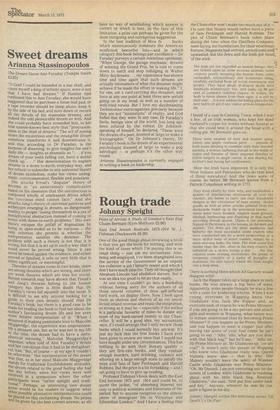Sweet dreams
Ariann a St assinopoulos
The Dream Game Ann Faraday (Temple Smith £3.95)
"0 God! I could be bounded in a nut shell, and count myself a king of infinite space, were it not that I have bad dreams." If Hamlet had confessed this to Ann Faraday, she would have suggested that he purchase a loose-leaf pad, or a tape recorder should he sleep alone, keep it by the side of his bed, and note down or record all the details of his miserable dreams, and indeed the odd pleasurable dream as well. And she could probably have reminded him, in her true nannie-knows-best style that "procrastination is the thief of dreams." The act of noting down the mysterious and the intangible dream soinehow transforms it and domesticates it, and this, according to Dr Faraday, is the Purpose of dreaming: to give insights for one's daily-life — insights as dramatic as ". . . if you dream of your teeth falling out, have a dental check up. . . ." Her determination to explain dreams in a down to earth, everyday way, and her refusal to subscribe to any universal theory of dream symbolism, make her views undogmatic, commonsensical, flexible and pointless.
She attacks Freud's "disguise" theory of dreams as "an unnecessary complication based on his obsession that the unconscious is composed wholly of unpleasant drives which the conscious mind cannot face." And she attacks Jung's theory of universal patterns and archetypes emerging in dreams, as dangerously leading to people "losing themselves in a sea of metaphysical abstraction instead of coming to terms with down-to-earth problems." Her own theory escapes the pitfall of dogmatism by being so open-ended as to be vacuous — the only criterion she permits is whether the interpretation satisfies the dreamer. The Problem with such a theory is not that it is Wrong, but that it is set up in such a way that it could never be proved wrong. Since it can never be tested against the evidence, and either Proved or falsified, it tells us very little that is either significarit, or meaningful.
Theories of dreams come in two kinds: there are strong theories which are wrong, and there are weak theories which are true but trivial. Recent research may have shown that Freud's and Jung's theories belong to the former category but there is little doubt that Dr Faraday's views fall squarely into the latter. It IS difficult to see why anyone looking for a guide to their own dreams should read Dr Faraday's book, but there is a good case to be made for reading the book to find out about the author's fascinating dream life and her even more bizarre interpretation of it: "When I dreamed of making passionate love to Malcolm Muggeridge, the experience was unquestionaNY a pleasant one, but as he was not in my life at the time, the dream had to have a metaphorical meaning." Malcolm Muggeridge's response, when told of Ann Faraday's dream and her conviction that it had to be metaphorical, was, "But, of course — at my age it couldn't
otherwise." Her interpretation of the dream was that, as in her mind Malcolm Muggeridge stands for traditional Establishment attitudes, the dream related to the good feeling she had the day before, when her views were well received in a symposium where the other Participants were "rather uptight and traditional." Perhaps, an interesting new dream game would be for readers to suggest what other possible alternative interpretations could loO placed on this enchanting dream. No prizes will be given for the best correct answer, as \de have no way of establishing which answer is correct or which is best. In the face of this limitation, a prize can perhaps be given for the most intriguing and outrageous suggestion.
In the best tradition of How to . . . books which monotonously dominate the American nonfiction bestseller lists—and in which category this book belongs par excellence — Dr Faraday purveys a certain relentless optimism: "When George, the garage mechanic, dreams of winning the Grand Prix, he is told to come down to earth and stop indulging in Walter Mitty daydreams . . . my experience has shown time and time again that such dreams are actually intimations of what the dreamer might achieve if he made the effort in waking life." I, for one, am a card-carrying day-dreamer, and have at any one point at least three new serials going on in my head, as well as a number of well-tried reruns. But I love my daydreaming Technicolour extravaganzas, precisely because they are not "intimations" of reality, and God forbid that they were. In any case, Dr Faraday's facile, benign view of the world, has long ago been refuted by the robust Dr Johnson: speaking of himself, he declared, "These were the dreams of a poet, doomed at large to wake a lexicographer." On Dr Johnson's theory, Dr Faraday's book is the dream of an experimental psychologist doomed at large to wake a pop astrologer — or perhaps it's the other way round.
Arianna Stassinopoulos is currently engaged in writing a book on leadership


































 Previous page
Previous page